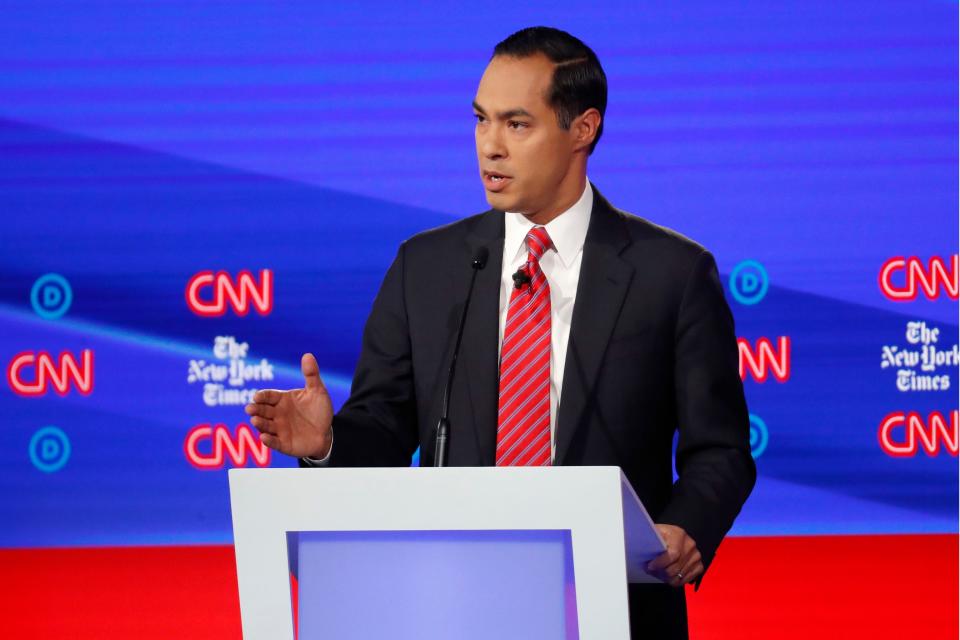Julián Castro didn't shine at the Democratic presidential debate, but it's still a win
At the end of Tuesday’s Democratic presidential debate, I almost felt sorry for Julián Castro because he was drowned out by the 11 other contenders on stage.
And he really needed a breakout moment to boost his candidacy in the most crowded field of presidential contestants in recent memory. Yet, my heart burst with pride just seeing him at the center of America’s political stage.
Castro is already an inspiration to a generation of Americans who wouldn’t even dare dream try to land in the White House.
Forget the political differences for a moment — and there are many with Castro’s agenda. It is just remarkably promising to see a Latino in the midst of one of the most existential election fights of a generation.
2020 Ohio debate: Bernie Sanders is big winner in Democratic debate, but not because of anything he said
The 45-year-old Castro is running for president in 2020 to represent every American regardless of race.
“I wasn't born a frontrunner. I won't give up the fight to shine a light on the struggle of vulnerable folks and underrepresented communities,” Castro said in a Twitter fundraising pitch after the debate.
I wasn't born a frontrunner. I won't give up the fight to shine a light on the struggle of vulnerable folks and underrepresented communities.
Donate $5 now and help us get the polls we need to stay on the debate stage. #DemocraticDebatehttps://t.co/UeuKfHeywe— Julián Castro (@JulianCastro) October 16, 2019
This isn't about identity politics
Conservatives like to call this sense of pride — regardless of ideology — “identity politics.” I call it a sense of community, a need to unify for common objectives and to fight off constant attacks against the marginalized.

Castro often mentions his humble upbringing in San Antonio, Texas, by a single mother — an activist who helped found the political party La Raza Unida. His grandmother was an immigrant from Mexico.
The family is deep-rooted in Texas politics. He served as a councilman and mayor of San Antonio. His identical twin brother, Joaquin, is a U.S. congressman.
Julián Castro, Stanford and Harvard-educated, is bright, articulate and no stranger to Washington, having served as secretary of Housing and Urban Development under former President Barack Obama.
A conservative's take: Winners and losers in the Democratic debate, from columnist Glenn Harlan Reynolds
Clearly, Castro has what it takes to win. But it’ll be tough to pull it off. He has been hovering at about 1% support in the polls and only raised $3.5 million in the third quarter — far below front-runners Sen. Bernie Sanders, Sen. Elizabeth Warren and Mayor Pete Buttigieg, who during the same period brought in $25.3 million, $24.6 million and $19.1 million, respectively.
Daring to dream can be a victory, too
His progressive agenda has raised eyebrows, especially his call for decriminalization of border crossers. Under his plan, entering the country illegally would still be a civil offense but people wouldn’t be prosecuted in the criminal system.
That thrilled immigrant activists. But it also made everyone else question his electability, given that he must appeal to the broader population to have a fighting chance. Latinos are an important voting bloc, but too many don’t go to the polls. In 2016, for instance, of the 27 million eligible to vote, only about 13 million cast a ballot, according to the Pew Research Center.
Castro’s performance at Tuesday’s Democratic presidential debate in Ohio didn’t fire up his campaign. But he’s putting on a good fight and sometimes daring to dream is a victory in itself.
Elvia Díaz is an editorial columnist for The Republic and azcentral, where this column originally appeared. Follow her on Twitter, @elviadiaz1.
You can read diverse opinions from our Board of Contributors and other writers on the Opinion front page, on Twitter @usatodayopinion and in our daily Opinion newsletter. To respond to a column, submit a comment to letters@usatoday.com.
This article originally appeared on Arizona Republic: Democratic debate: Julian Castro didn't shine, but it's still a win

